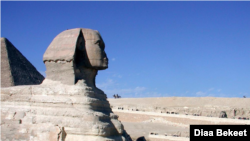Egypt on Wednesday said police have killed nine suspected members of a militant group with links to the now-outlawed Muslim Brotherhood in two separate Cairo shootouts, while a rights lawyer said prosecutors have ordered a prominent leftist activist to remain in custody pending an investigation into charges that include joining the Muslim Brotherhood.
The Interior Ministry said in a statement the alleged militants were members of the Revolution Brigade, a breakaway faction of the Muslim Brotherhood group that has targeted security forces in militant attacks.
It said the exchanges of fire took place as police were trying to arrest them at their alleged hideouts in the northeastern Obour district and the southern May 15th City suburb.
The ministry, which oversees police forces, said the dead included a militant leader accused of killing a top military officer, Brig-Gen. Adel Ragai, commander of the army’s 9th armored division, who was gunned down in Oct. 2016 near his home in Obour. The suspected militant leader was also allegedly behind an attack on a checkpoint in August that year in the northern Nile delta province of Menoufia, the statement said.
The ministry claimed rifles and ammunition were found at the scene.
Egypt is fighting an insurgency led by a local affiliate of the Islamic State group in the Sinai Peninsula as well as smaller militant groups allegedly belonging to the Brotherhood.
Meanwhile, Gamal Eid, the head of the Arab Network for Human Rights Information, said prosecutors ordered activist Kamal Khalil to remain in custody for 15 days pending an investigation into charges of joining a terrorist group and disseminating false news.
“Membership in an outlawed group” is Egyptian government parlance for having ties to a range of groups that it has outlawed, including the Muslim Brotherhood, an organization that authorities banned and labeled a terrorist group in 2014.
Eid told The Associated Press on Wednesday that police forces arrested Khalil earlier this week from his home in Cairo.
The prominent activist’s arrest came in the wake of corruption allegations against the Egyptian military made earlier this month by military contractor and businessman-in-exile Mohamed Ali.
In viral social media videos posted over the past week, the entrepreneur alleged large-scale misuse of public funds in the building of luxurious hotels, presidential palaces and a tomb for general-turned-president Abdel-Fattah el-Sissi’s mother, who died in 2014.
Sissi has angrily dismissed the allegations as “sheer lies and defamation.” He portrayed Ali’s videos as an attempt to weaken Egypt and undermine the public’s trust and confidence in the military and its leader.
Since leading the military’s 2013 overthrow of an elected but divisive president — the Brotherhood’s Mohamed Morsi — Sissi has overseen a crackdown on dissent, jailing thousands of Morsi supporters along with secular, pro-democracy advocates, imposing tight control of the media and rolling back freedoms won in a popular 2011 uprising that brought down the 30-year rule of Hosni Mubarak.
In 2012, U.S.-educated Morsi was Egypt's first freely elected civilian president in Egypt's modern history.








